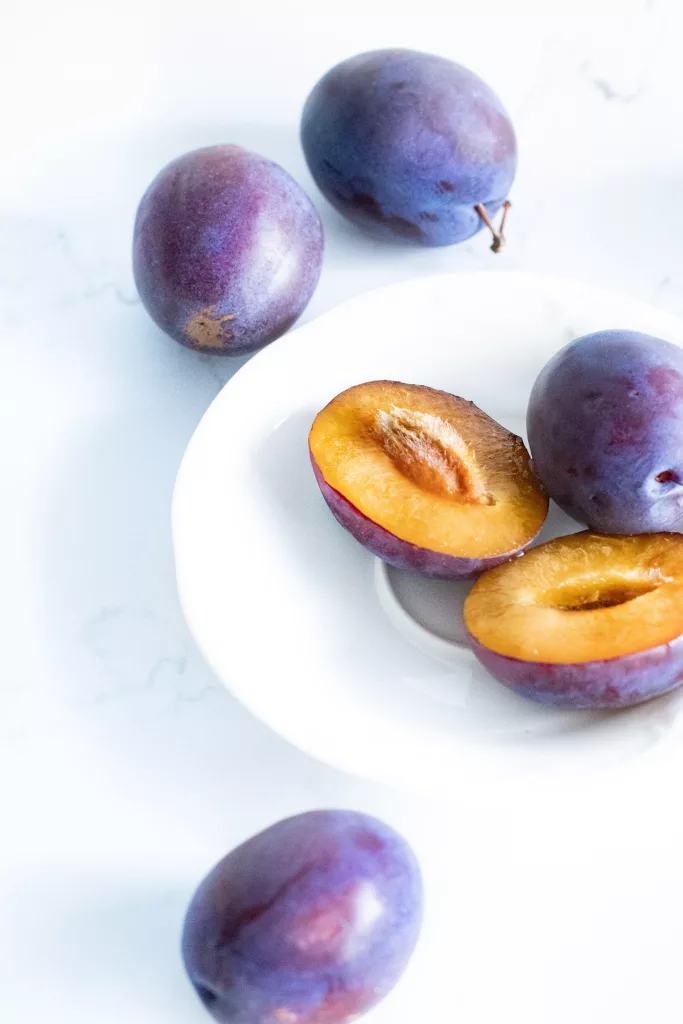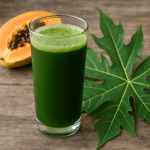When it comes to promoting overall well-being, the natural world offers a myriad of treasures. Among these, prunes, also known as dried plums, stand out as a true super fruit packed with health benefits. Often underestimated, prunes are more than just a tasty snack or a natural sweetener.
In this blog post, we’ll delve into the remarkable health benefits of prunes, exploring the numerous ways they can enhance our vitality and improve various aspects of our well-being.

Table of Contents
Nutritional Value of Prunes
Prunes, also known as dried plums, are not only delicious but also a nutritional powerhouse packed with essential vitamins, minerals, and other beneficial compounds. Here is the approximate nutritional value of prunes per 100 grams:
- Calories: 240 kcal
- Carbohydrates: 63.88 grams
- Dietary Fiber: 7.1 grams
- Sugars: 38.13 grams
- Protein: 2.18 grams
- Fats: 0.38 grams
- Saturated Fat: 0.02 grams
- Monounsaturated Fat: 0.03 grams
- Polyunsaturated Fat: 0.13 grams
- Trans Fat: 0 grams
- Cholesterol: 0 milligrams
- Vitamins:
- Vitamin A: 927 IU
- Vitamin C: 0.6 milligrams
- Vitamin K: 59.5 micrograms
- Folate: 2 micrograms
- Niacin: 1.882 milligrams
- Vitamin B6: 0.205 milligrams
- Pantothenic Acid: 0.422 milligrams
- Riboflavin: 0.186 milligrams
- Thiamin: 0.05 milligrams
- Minerals:
- Potassium: 732 milligrams
- Calcium: 43 milligrams
- Iron: 0.93 milligrams
- Magnesium: 41 milligrams
- Phosphorus: 69 milligrams
- Sodium: 2 milligrams
- Zinc: 0.44 milligrams
- Copper: 0.225 milligrams
- Manganese: 0.299 milligrams
- Phytonutrients:
- Beta-carotene: 429 micrograms
- Lutein + Zeaxanthin: 759 micrograms
It’s essential to remember that the nutritional content may vary slightly depending on the variety and how the prunes are processed and dried. However, incorporating prunes into your diet can provide numerous health benefits and contribute to a balanced and nutritious lifestyle.
Health Benefits of Prunes

1. Digestive Health
Prunes are renowned for their exceptional ability to promote digestive health. They are an excellent source of dietary fiber, containing both soluble and insoluble fiber. This unique combination supports healthy bowel movements, preventing constipation and promoting regularity. The soluble fiber in prunes forms a gel-like substance in the intestines, softening the stool and aiding its passage. Meanwhile, the insoluble fiber adds bulk to the stool, ensuring healthy movement through the digestive tract.
Moreover, prunes contain sorbitol, a natural sugar alcohol with a mild laxative effect. Sorbitol helps stimulate bowel movements and alleviates the discomfort associated with constipation. Regular prune consumption can therefore play a significant role in maintaining a healthy digestive system.
2. Bone Health
Prunes have an impressive impact on bone health due to their rich nutrient profile. They are particularly high in vitamin K, a key nutrient that plays a crucial role in bone metabolism. Vitamin K is essential for the activation of osteocalcin, a protein responsible for binding calcium to the bone matrix, thus enhancing bone mineralization.
Additionally, prunes contain significant amounts of boron, a mineral that aids in the absorption of calcium, magnesium, and vitamin D—essential nutrients for maintaining strong bones. Research suggests that regular prune consumption may help prevent bone loss, reduce the risk of osteoporosis, and support overall skeletal health.

3. Heart Health
Prunes can contribute to a healthy heart by offering various cardiovascular benefits. Their high potassium content helps regulate blood pressure, promoting healthy heart function and reducing the risk of hypertension. Additionally, prunes are rich in antioxidants, such as phenolic compounds and flavonoids, which combat oxidative stress and inflammation—a leading cause of heart disease.
The soluble fiber found in prunes also plays a vital role in heart health. It helps lower LDL (bad) cholesterol levels by binding to cholesterol in the digestive system and preventing its absorption into the bloodstream. By reducing cholesterol levels, prunes contribute to the prevention of plaque buildup in the arteries, promoting a healthy cardiovascular system.
4. Antioxidant Powerhouse
Prunes possess remarkable antioxidant properties that can help protect our bodies from oxidative damage caused by free radicals. Free radicals are unstable molecules that, when present in excessive amounts, can lead to chronic diseases, premature aging, and other health issues.
Prunes contain a wide range of antioxidants, including phenolic compounds, anthocyanins, and vitamin C. These antioxidants help neutralize free radicals, reducing oxidative stress and inflammation throughout the body. By doing so, prunes may contribute to a lower risk of chronic conditions, such as cancer, diabetes, and neurodegenerative disorders.
Conclusion
Prunes, with their diverse array of health benefits, truly deserve their status as a super fruit. From improving digestive health and promoting bone strength to protecting the heart and fighting off oxidative stress, prunes offer an impressive range of advantages for overall well-being.
Including prunes as a regular part of a balanced diet can help harness their potential and unlock their full health benefits.
So, why not indulge in the deliciousness of prunes while reaping the rewards they offer? Your body will thank you for it!
Did you find this helpful? Let us know in the comments.
You can also visit our Facebook and YouTube pages to know more about plants and their health benefits.
You might also like:








